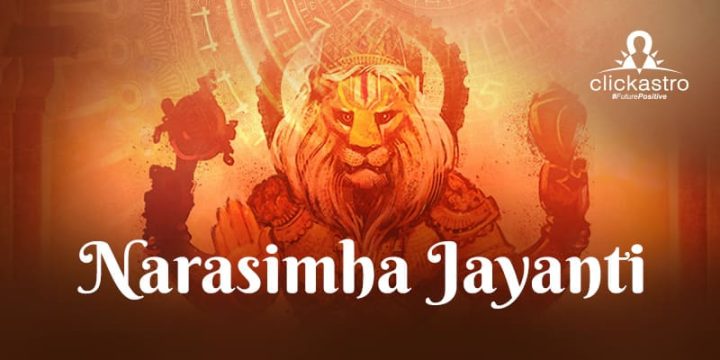Narasimha Jayanti is a revered
Hindu festival honoring the fourth incarnation of Lord Vishnu, Narasimha. Occurring on the fourteenth day (Chaturdashi) of the bright fortnight (
Shukla Paksha) in the Hindu lunar month of Vaisakh, this auspicious day holds immense significance for devotees.
In 2024, Narasimha Jayanti falls on May 21st, a Tuesday.
According to Hindu mythology, Lord Vishnu took the form of Narasimha, a half-man, half-lion deity, to vanquish the demon king Hiranyakashipu and protect his devotee Prahlada. The legend symbolizes the triumph of good over evil and the preservation of righteousness. On Narasimha Jayanti, devotees engage in elaborate rituals, fasting, and prayers, seeking the divine blessings of Lord Narasimha for spiritual growth, protection, and the removal of obstacles. Temples dedicated to Lord Narasimha witness heightened celebrations, emphasizing the devotion and reverence accorded to this revered deity.
The Legend of Narasimha
According to Hindu mythology, the legend of Narasimha unfolds with the demon king Hiranyakashipu’s tyranny and arrogance. Having secured a boon from Lord Brahma granting him near invincibility, Hiranyakashipu unleashed terror upon the world, challenging even the gods themselves. However, his abuse of power and disregard for righteousness invited divine retribution.
His son,
Prahlada, remained steadfast in his devotion to Lord Vishnu despite his father’s malevolence. Angered by Prahlada’s unwavering faith, Hiranyakashipu subjected him to various trials, all of which proved futile in swaying the young devotee’s allegiance.
In a climactic showdown, Lord Vishnu incarnated as Narasimha, a formidable combination of man and lion, to fulfill the prophecy and vanquish the tyrant. Emerging during twilight, Narasimha, neither fully human nor entirely animal, laid waste to Hiranyakashipu, thus nullifying the boon’s conditions and restoring balance to the universe.
The legend of Narasimha symbolizes the triumph of good over evil and the eternal struggle between righteousness and tyranny. It serves as a timeless reminder of the consequences of hubris and the inevitability of divine justice, reaffirming the belief in cosmic order and moral accountability.
Important Timings On Narasimha Jayanti 2024
- Sunrise – May 21, 6:59 PM
- Sunset – May 21, 6:59 PM
- Chaturdashi Tithi Timing – May 21, 05:40 PM – May 22, 06:48 PM
- Madhyahna Sankalp Time – May 21, 11:04 AM – 01:42 PM
- Narasimha Jayanti Sanyakal Puja Time – May 21, 04:21 PM – 06:59 PM
- Parana Time – May 22, 5:46 AM
Rituals and Observances
Narasimha Jayanti is a day of deep spiritual significance for Lord Vishnu’s devotees, marked by fervent devotion and elaborate rituals. The observances commence with devotees rising early during the Brahma Muhurat, an auspicious time before dawn, to partake in purifying rituals, including a sacred bath. This act symbolizes the purification of the body and soul, preparing devotees for their devotional practices.
Adorned in new attire, devotees embark on a journey of worship, beginning with special pujas conducted in homes and temples dedicated to Lord Narasimha. Often, these ceremonies are accompanied by the worship of Goddess Lakshmi, the divine consort of Lord Vishnu, further enhancing the spiritual ambiance. Offerings such as gram dal, jaggery, flowers, sweets, kumkum, saffron, and coconuts are meticulously presented to the deity as tokens of heartfelt devotion and reverence.
Fasting is a common and integral practice observed on Narasimha Jayanti, commencing at sunrise and concluding at the following day’s sunrise. During this period, devotees abstain from consuming cereals or grains, opting instead for a single meal devoid of such items. This act of self-discipline symbolizes the devotee’s willingness to sacrifice worldly comforts in pursuit of spiritual enlightenment and divine blessings.
Recitation of Narasimha mantras holds paramount importance during the festivities, with devotees often utilizing
rudraksha malas (prayer beads) to aid in their devotional practices. These sacred chants are believed to invoke the blessings of Lord Narasimha, paving the way for a righteous and meaningful life filled with spiritual fulfillment and divine grace.
Acts of charity are also encouraged on Narasimha Jayanti as a means of expressing selflessness and compassion towards the less fortunate. Devotees often donate clothes, precious metals, and sesame seeds to those in need, embodying the spirit of generosity and empathy espoused by Hindu teachings.
In essence, Narasimha Jayanti transcends mere ritualistic observance, offering devotees an opportunity for spiritual introspection, devotion, and selfless service. Through these practices, devotees seek to deepen their connection with the divine and reaffirm their commitment to leading lives guided by dharma (righteousness) and compassion.
Spiritual Significance
Narasimha Jayanti carries deep spiritual significance, serving as a sacred occasion for devotees to embark on a journey of inner purification and divine communion. Through fasting, meditation, and devout worship, individuals seek to cleanse their minds and hearts of impurities, cultivating a deeper connection with the divine. This auspicious day offers a unique opportunity for devotees to seek the blessings of Lord Narasimha for the removal of obstacles and adversities encountered on their spiritual path.
Fasting serves as a symbol of self-discipline and renunciation, facilitating introspection and spiritual growth. Meditation practiced earnestly during Narasimha Jayanti, enables devotees to attain inner peace and enlightenment, transcending worldly distractions and attuning themselves to the divine presence within. Thus, Narasimha Jayanti becomes not only a day of religious observance but also a profound spiritual journey towards self-realization and divine grace.
Temple Celebrations
In the vibrant cultural landscape of Southern India, Narasimha Jayanti is celebrated with unparalleled zeal and devotion, especially in the plethora of temples dedicated to Lord Narasimha. These sacred sites become hubs of spiritual activity, bustling with special prayers, elaborate rituals, and grand pujas conducted in honor of the deity. Priests and devotees converge in large numbers to partake in the festivities, immersing themselves in fervent meditation and worship.
The air is filled with the melodious chants of hymns and mantras, creating an atmosphere charged with divine energy. Through their collective devotion, devotees seek the benevolence and protection of the lion-man incarnation of Lord Vishnu, reaffirming their unwavering faith and reverence. Temple celebrations on Narasimha Jayanti serve not only as religious gatherings but also as vibrant expressions of cultural heritage and spiritual devotion, fostering a sense of unity and reverence among the devotees.
Conclusion
In conclusion, Narasimha Jayanti is more than just a religious observance. It encapsulates a spiritual journey towards righteousness and liberation from worldly attachments. It serves as a poignant reminder of the eternal struggle between good and evil, symbolized by the divine intervention of Lord Narasimha. Through the diligent practice of rituals, fasting, meditation, and acts of charity, devotees strive to purify their souls and align themselves with the divine will.
Narasimha Jayanti inspires individuals to embrace the principles of dharma (righteousness) and lead lives imbued with compassion, wisdom, and devotion. As we commemorate this auspicious occasion, may we be guided by the teachings of Lord Narasimha to uphold moral integrity, cultivate spiritual awareness, and foster harmony in the world. May the divine grace and protection of Lord Vishnu accompany us on our journey towards spiritual enlightenment and ultimate liberation.








